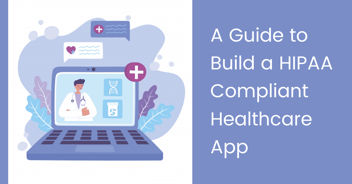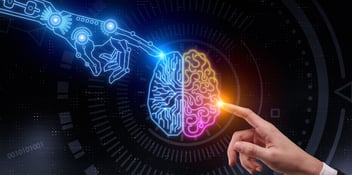AI is poised to bring transformational change in healthcare. Artificial intelligence and its tools assist healthcare professionals powerfully, allowing them the potential to transform different aspects of patient care and the hospitals’ admin processes.
“According to Accenture analysis, when combined, key clinical health AI applications can potentially create $150 billion in annual savings for the United States healthcare economy by 2026."
 Source
Source
Whether it is to figure out new links between genetic codes or understanding surgery-assisting robots, AI is bound to grow and revolutionize healthcare and many other industries. Through machines, we can predict, understand, learn, and apply it in healthcare. Nowadays a lot of AI-based Mobile Applications are available in Healthcare.
Artificial intelligence is bound to bring a transformational force to healthcare. But, how will providers and patients benefit from the impact of AI-driven tools? And, how will the healthcare industry utilize AI for a better world?
Let’s explore!
What is AI in Healthcare?

AI in healthcare means efficient data utilization for producing positive patient outcomes using highly advanced machine learning algorithms.
The underlying value and demand of AI are to improve the decision-making power of humans while automating processes for delivering quicker, more innovative, and improved outcomes to both the patients and the doctors.
In Artificial Intelligence, predictions are the core aspect of processes that healthcare professionals otherwise perform daily. Using these predictions, AI raises the potential to operate speedily and accurately while enhancing the human experience for satisfactory results.
What can Healthcare Leverage from AI? The Benefits!

A lot, indeed! Healthcare has a lot to leverage from Artificial Intelligence and its tools. The Healthcare industry uses it for:
- Attaining accurate diagnosis
- Identifying risk populations
- Managing admin resources
- Forecast the potential value of research projects
- Understand the patients better
- Comprehend patient’s response towards medicines and treatments
AI is all set to unlock its unlimited potential in the healthcare industry soon in the coming years. The break down of how AI-based solutions in healthcare are already assisting thousands is mentioned in the article below:
- Predictive Analytics for Optimum ‘Hospital Resource Optimization’
Artificial Intelligence in Healthcare helps seamless admin supply and demand of hospital resources. Using predictive analysis allows the timely allocation of limited budgets more efficiently. Healthcare can crunch massive patient data to deliver timely services and reports to the patients effectively.
The data in healthcare generally surrounds types of treatments undergoing, forecasting the demands in this sector, and allocating limited funds to different departments to make the most of what is available.
For instance, a location that might be infected with the flu epidemic can easily be identified/predicted and worked upon using the AI-enable predictive analysis. The Healthcare industry can plan and respond efficiently to such conditions.
What else? AI can help humans automatically define the severity of the forthcoming pandemic by analyzing current population disease data. Further, the hospital processes and the medical institutions are automated to plan and respond vigorously to such pandemics.
2. Unifying Machine & Mind
Computers for communication are not new, but managing to create a direct interface between the human mind and technology (without computers and its components) is a pioneering research area with consequential applications for patients.
Brain-computer interfaces are supported by AI that has the potential to restore the rudimentary experiences of those who lost their ability to speak, move, and interact meaningfully due to some neurological disease or unfortunate trauma to the nervous system.
BCIs or Brain-computer interfaces have the potential to radically enhance the quality of life of patients, especially those with spinal cord injuries, strokes, and locked-in syndrome
3. Maturing Next-Gen Radiology Tools
AI enables highly accurate next-gen radiology tools to replace the need for tissue samples. Radiological images procured by CT scanners or X-rays and MRI machines offer non-invasive visibility into the human body. However, physical tissue samples acquired from biopsies still promotes the risk of infection.
The maturing next-gen radiology tools allow clinicians to develop an accurate understanding of the behavior of the diseases for them to be identified and treated. Even diseases like cancer will be better defined and targeted more appropriately. AI enables virtual biopsies and modernizes radiomics to better focus on image-based algorithms. Such next-gen radiology tools are helping the healthcare industry deliver better results.
4. Medical Devices Intelligence
To catapult the medical device industry into this century and in the future, it is crucial to intersect healthcare, machine learning, and robotics. Remember, we spoke about automation in healthcare? Using AI in healthcare, anesthesiology and ventilators are automated to monitor the biofeedback signals seamlessly. It includes blood plasma levels, heart rate, and blood pressure of the patients that can be tracked easily using the automation of these devices.
It is challenging for humans to analyze complex patient data otherwise. Still, AI can be trained to crunch huge data and figure out the anomalies in predicting the patients’ health problems effectively.
Reminder: AI is Not Replacing the Doctors

The technology is here just to empower healthcare professionals and not replace them altogether. AI adds data-driven context for adequately supplying the correct information at the right time to the right individual. Since medical professionals will make more educated decisions, it would be easy for them to be proactive in human care rather than reactionary.
5. AI & Machine Learning for Drug Discovery
Artificial Intelligence is applicable in drug discovery. That’s because we have unlocked the visibility into how variableness between genetic sequences affects genomics to understand the patient’s reaction towards novel drugs. In healthcare, especially pharmaceuticals research, AI generates infinite novel proteins, molecules, and medications to determine the feasible candidates to move ahead through the process.
While these molecular combinations are generated on a large scale, healthcare industries can experience higher profits and better efficiency to deliver to the patients. With this effectiveness in the process, healthcare professionals will minimize the prices, quality care, and effective service for every patient.
6. Smartphone Selfies - Robust Diagnostic Tool
The future of AI in healthcare is bright, as experts believe that selfies taken from the smartphone will be an essential supplement to clinical quality imaging. With the continuous development and modification of the cameras in the phone, images viable for analyzing are possible. Ophthalmology and dermatologists are early recipients of smartphone selfies as a robust diagnostic tool.
| As per ESC or European Society of Cardiology, “‘Selfies’ could be used to detect heart disease: new research uses artificial intelligence to analyses facial photos.” |
Researchers in the UK have even developed a tool that can identify the developmental issues in children just by analyzing the child’s face. Like his eyes, nose, jawline, and other features, the features of the child identify the abnormalities in the child. That’s, indeed, a revolution in the healthcare industry if utilized correctly.
7. EHR Use Minimization
The Healthcare industry has digitized with the introduction of EHR; however, this switch has welcomed several problems, including substantial endless documentation and user burnout. EHR development is now utilizing the AI to create more interactive interfaces and tools to automate the routine processes for the least time consumption of the users.
Since users spend most of their time on three primary tasks in the healthcare industry - clinical documentation, data entry, and sorting it all. The introduction of AI in the healthcare industry has helped sorted such redundant tasks by replacing more human efforts with voice recognition and dictation. AI will be automating the inboxes to simplify tasks like medication refills and outcome notifications.
8. Enabling Clinical Decision Support System using AI
Another application of AI in healthcare is through clinical decision support. We understand that machines can’t match the experience and information healthcare professionals have gathered in all the years of their training and career. So, the clinical decision support system allows healthcare professionals the power to highly custom, efficient, and valuable decisions to deliver the best help for the patients.
The Healthcare industry can organize patient’s medical history, allergies, care preferences, and all other helpful information for both the patients and the hospitals. It helps the healthcare industry to deliver personalized healthcare services to patients for a satisfactory experience.
Application of AI in Healthcare

The Healthcare industry is in a constant juggling mode when managing the patient’s data and delivering them refined services that are satisfactory and rapid. Some departments are always under the watchful eye of the budget. The introduction of AI has helped cool down data management, sorted patient information, effective utilization of budget, and seamless delivery of services to treat patients more effectively altogether.
Partnering with AI developers can help healthcare firms gain a competitive advantage over the traditional process of evaluating the information
AI is not a technology coming down the pike; it’s already here. It can be seen everywhere, in every industry. AI in healthcare is pretty visible, and so is the effectiveness in the outcomes and processes. It delivers results for those who seize the opportunity to provide premium and cost-effective care services to leapfrog the competitors.
Need Expert help? Contact us, share your ideas and let's turn your dream project into reality together.






